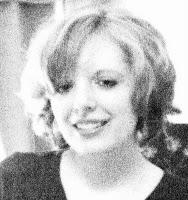
Welcome back Nicole. In doing research for our earlier interview, I was inspired by all you do in the literary world and wanted to learn more.
Your published fiction ranges from literary to historical to fantasy. An excerpt of your short story
“Reaching Out to You” won a recent romantic themed writing contest."One Untruth" a short fiction story, was published in the national literary magazine, Pen Woman. Where do you find your inspiration?
I believe that a story can come about in a myriad of ways; a phrase overheard, a simple everyday gesture, a notion, a dream or impression tugging at your sleeve in want of a form and voice. A fantasy story entitled, “The City of Amaranth” came from a dream I’d had about a golden palace of “gods” who were actually mortal. The story became an unexpected satire touching not only upon deeper spiritual themes but also certain aspects of the publishing world itself and the “gatekeepers” of it, so to speak. “One Untruth", came from a simple 1950s photograph I discovered when moving old boxes to help a friend clean out their basement. I asked about this image of a couple and their children only to find that my impressions about their life together weren’t far from the truth. The story behind the story can be very interesting.
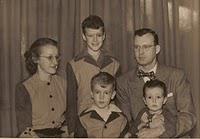
I've seen old photographs like that and often wondered about the stories behind them. How did you get started in your writing career?
I was quite determined and quite young when I chose to be a writer. It was something I’d always wanted to do, a gift I wanted to give myself. I knew it was a ‘difficult’ field yet if not for my own passion for it, I think the field chose me- it was inevitable that we’d meet along the “road less traveled”. I always imagined that it would be good to start young. I remember writing to a male columnist that I’d always admired asking for a few words of advice. Pleasantly enough, he told me that to break into the field at my age couldn’t be done; it was impossible. It would be better if I started in tiny circles and waited. I understood that it wouldn’t be easy, but something about “impossible, can’t, no” has always been oddly motivational for me.
It was about six months later that my first story pitch was accepted and published. I was nineteen doing entertainment journalism a short time later; one of the profiles was of a Broadway actress who I got to meet in person and take a quick back-stage tour of The Phantom of the Opera set with.
To make a long story short, after building my portfolio and taking a turn as a contributing editor, I turned back to my first love of fiction. When those works started being accepted, I was also taking on additional freelance journalism at the time yet wanted more in the literary world. I set myself to thinking about all that I read and experienced in publishing and what kind of a publication I would most want myself. Notebook pages started filling with sketches of what would become The Write Place At the Write Time. Research, consulting with copyright lawyers, design, submission calls and inquiry letters for the first interviews; all were set in motion. To have an incredible team-mate to co-navigate the publication with me as Assistant Editor, I had only to look at my own mentor and creative writing inspiration who’d taught me for so many years- my mother; and so it began as a mother-daughter endeavor to re-imagine the face of online publishing.
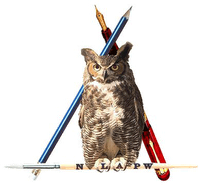
At twenty-two, I became one of the youngest members of the NLAPW (National League of American Pen Women).
My heartfelt advice to emerging writers at any age, at any stage is to surround yourself with a support network. Most importantly, believe in yourself and your love of the craft. I was fortunate to have a family that was encouraging me at every step.
Thank you for sharing such wonderful words of encouragement. Writing is such a creative process, it can be challenging to rate the character or quality of one piece over another. That being said, do you have any preferences within your own writing portfolio?
Each piece has its own significance to the writer - closeness to the characters, affinity for theme, etc… Yet if I had to pick out a few pieces that I love most in terms of the entire process of the story, they would be “Fragile Things”, based loosely on a heart-wrenching advice column I kept in a drawer for years, thinking, ‘My God, what happened there?’, "Thief of Shadows" using a fairy tale archetype to delve into the psychology behind a newspaper headline I’d read and"The Age of Victoria" – a historic, emotive piece based on a few first sentences I had written about 9 years ago in a painting class. I hadn’t known much at all about the locale and time period when I first built the outer frame of the story; when I did the research, the elements I’d chosen, such as the protagonist’s vocation, were fittingly accurate. This is where I feel the divine inspiration comes into play.
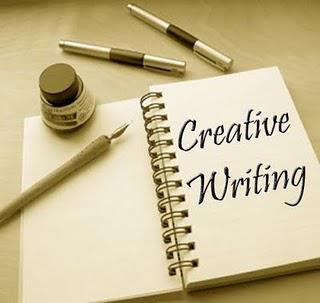
Thank you for sharing material from your creative writing course, “Passion, Philosophy and Prose: The Power of the Pen". The information is thought-provoking and insightful. Your comments in the first paragraph caught my attention, “One of the foundations upon which I build my continually improved-upon philosophy about the craft of writing, is that often times, the 'rules' are invitations to do something entirely opposite and therefore, utterly original.” Is your goal of the course to help writers explore the inspiration for creative writing or more to learn the mechanics of it?
The first session of the course was this past winter from Feb 23rd - March 23rd. Students are still in contact and it has been such a wonderful experience to see their responses to the different course materials spread out over four sessions (four weeks). The sensory exercises, visualizations were immensely revealing about what they needed or wanted on a deeper level to do with their writing. Each has a unique talent and they rose to all occasions. It’s enlightening to teach because you fall in love with the subject all over again and learn from the perspective of your students. To know that they’ve gotten value out of the course is above and beyond all of the fun we’d had. It's truly about the creative process as opposed to the mechanics- yet it does have some helpful hints and resources for submitting work.
Are there any books you recommend related to the mechanics of writing?
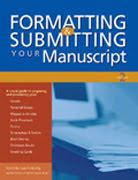
Yes, I do recommend to writers the book “Formatting and Submitting Your Manuscript” by Cynthia Laufenberg. It is one of the best for queries, outlines, proposals and nearly any format you would ever need. A book that deals with the mechanics and tools of the craft itself, is "The Portable MFA in Creative Writing" by the New York Writer’s Workshop. They are both, I feel, desk-top essentials in a writer’s office.
Nicole, it’s been a pleasure learning more about your writing. I’m looking forward to following your journey. Readers can learn more by visiting The Write Place at the Write Time. Are there any favorite quotes you would like to share?
Writing a book is an adventure. To begin with, it is a toy and an amusement; then it becomes a mistress, and then it becomes a master, and then a tyrant. The last phase is that just as you are about to be reconciled to your servitude, you kill the monster, and fling him out to the public. ~ Winston Churchill

